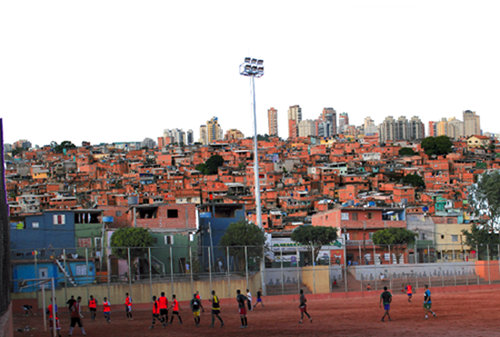ANCB Re-act Lab São Paulo Architecture Experiment
12-22 August 2010

initiated with Elisabete França and the Secretaria Municipal de Habitação of the city of São Paulo (Sehab), S.L.U.M. Lab Columbia University and ANCB
KEYNOTE LECTURES Aug 12th and 13th. Open to public.
As audience capacity is limited, registration is necessary. Places will
be allocated on a first-reply-first-serve basis to
registrations received here only. Please do not reply by e-mail.
Thursday, August 12th 2010
15.00 Hans-Jürgen Commerell ANCB
Welcome
15.30 Alfredo Brillembourg and Hubert Klumpner S.L.U.M. Lab, Columbia University, Marcos L. Rosa ETH Zürich/Technical University Munich and Estúdio Tático, Eduard Kögel Habitat Unit TU Berlin
Introduction
16.30 Elisabete França Secretary of Housing Department City of São Paulo (Sehab)
The informal city in the 21st century: plans and projects
17.30 Reiner Nagel Department for Urban Development City of Berlin
Urban development planning in Berlin - current framework conditions and projects
18.30 Exhibition Openings
Measure of Man-Measure of Architecture and The Informal City of Century XXI
Friday, August 13th 2010
9.30 Henk Ovink Director for National Spatial Planning the Netherlands, Ministry of Housing, Spatial Planning and the Environment
The specificity of urban planning: design and politics
Urban ropeways: An alternative means of transportation
11.30 Irene Feige BMW Institute for Mobility Research
Research Focus "Mobility Cultures in (Mega-)cities"
Lunch
14:30 Luis Octavio Faria e Silva Escola da Cidade São Paulo
Designing Sao Paulo: scales and approximations
Converging Methodologies in Urban Design
16:30 Markus Dochantschi Studio MDA NewYork and Frankfurt
Educational Infrastructure
17:30 Alfredo Brillembourg and Hubert Klumpner Urban-Think Tank
Curriculum for a crowded city
Workshop Description and Background
This 10-day Re-act Lab research workshop will introduce a group of advanced students from across the world to the realities of Brazilian cities and provide the wider public with internal and external perspectives on these. In a series of public lectures and discussions the workshop will: introduce São Paulo's metropolitan area by revealing the contrasting morphologies and urban tissues produced over time; address the critical role of everyday life in the experience of urban space; question the possibilities created for architecture and urban planning when housing basic municipal services-key structures in improving quality of urban life; and highlight the need to develop partnerships between the city planning authorities and urban pioneers, in order to build liveable cities at the beginning of the 21st century.
Workshop Focus: PARAISÓPOLIS Future City 2020
In parallel to the background lectures and discussions, an intensive design laboratory will explore the potentials of the relationship between existing formal and informal urban realties in cities of the southern hemisphere with Paraisópolis, in the Morumbi neighborhood of São Paulo as a test site. Structured into three modules, the design laboratory will: (1) explore alternatives to vehicle transport and develop scenarios that integrate infrastructures at both macro and micro levels to activate urban life, (2) respond to the urgent demand for new housing and quality urban space and (3) explore the capacity of micro infrastructures to remodel the existing built, real city.
Workshop Aim
The aim of the design laboratory is to generate visions beyond current trends in order to find long-term solutions with the potential to transform cities. It will investigate the process of moving from pilot projects for connected housing and micro-infrastructures to comprehensive design policies and strategic planning. It will consider the possibilities for designing better quality environments through the provision and retrofitting of micro-infrastructures and local-scale interventions, based on cutting-edge technologies for a range of issues including mobility (e.g. cable cars, funiculars and electrical vehicles), public lighting and illumination, public utilities (e.g. garbage collection and disposal), alternative energy production, and the management of traffic flows and parking.
A research workshop by Secretaria Municipal de Habitação de São Paulo, S.L.U.M. Lab and GSAPP Columbia University New York and Faculty of Architecture and Urbanism of the Escola da Cidade São Paulo and Technical University Berlin with Academy of Applied Arts Munich and Faculty of Architecture of ETH Zurich
within the framework of the Re-act Lab programme of Aedes Network Campus Berlin
in cooperation with Alfred Herrhausen Society, Doppelmayr, Secretaria Municipal de Habitação de São Paulo, Columbia University, Netherlands Ministry of Spatial Planning, Technical University Vienna, Technical University Delft, ifmo Institute for Mobility Research and ARUP
Studio Directors: Prof. Alfredo Brillembourg & Prof. Hubert Klumpner (Columbia University, N.Y. and Swiss Federal Institute of Technology Zürich / ETH), Marcos L. Rosa (Technical University Munich and Estúdio Tático) and Dr. Eduard Kögel, (Habitat Unit, Berlin Institute of Technology).
Coordinating Professors: Lindsey Sherman and Michael Contento (GSAPP Columbia University, N.Y.) with the assistance of Marielly Casanova, Daniel Schwartz and Katharina Anna Rudolph (Urban Think-Tank)
Guest Lecturers: Ciro Pirondi (Director, Escola da Cidade), Joana Gonçalves (FAUUSP, Technology Department; AA Graduate School, Sustainable Environmental Design. London and Sâo Paulo), Henk Ovink (Director for National Spatial Planning and of Research, Design and Strategy at the Dutch Ministry of Environment Netherlands Ministry of Housing), Andreas Rudolph and Michael Klimmer (Doppelmayr), Steven Dale (Creative Urban Projects), Trent Lethco (ARUP) and others to be confirmed.
About Re-act Lab
Re-act Lab is a research format of the Aedes Network Campus Berlin. With a potential-focused rather than problem-focused agenda, it confronts the particular challenges of cities or regions throughout the world by facilitating transdisciplinary enquiry into responsible actions in architecture and urbanism.

